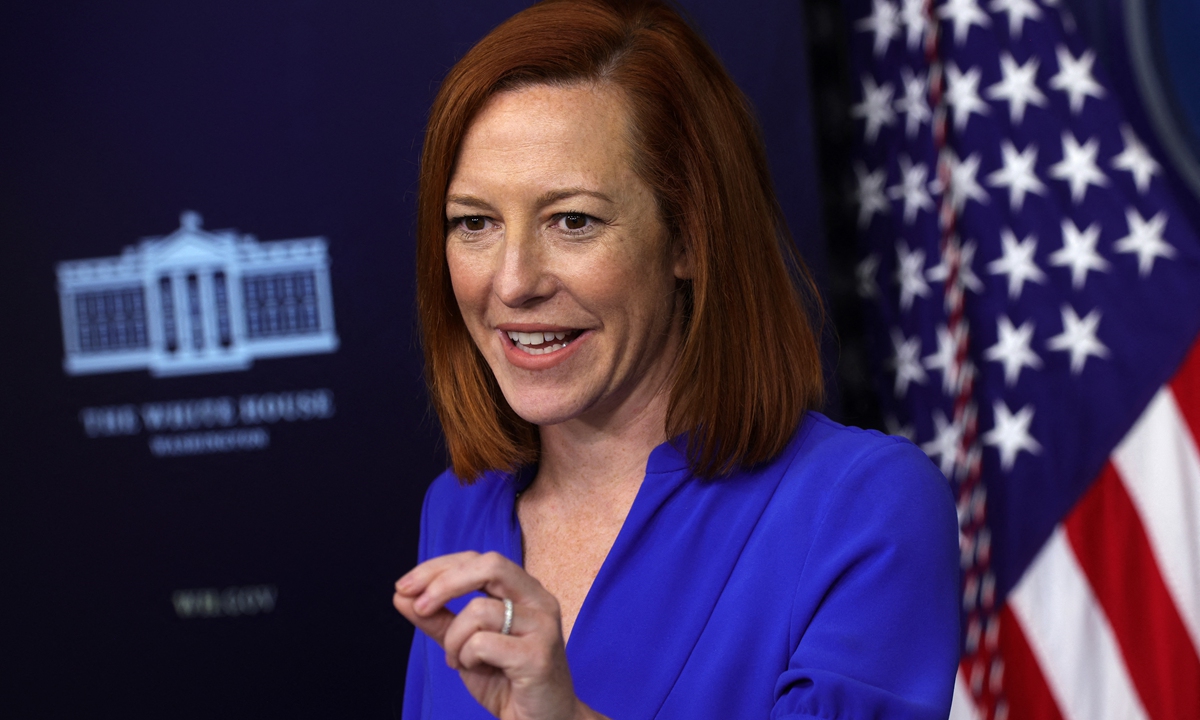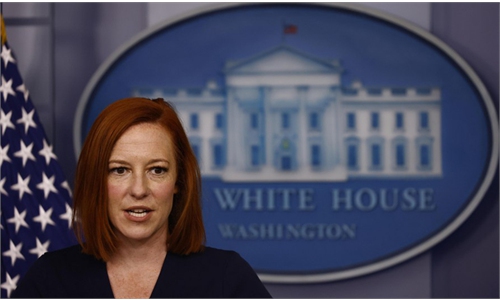
White House Press Secretary Jen Psaki speaks during a daily press briefing at the James Brady Press Briefing Room of the White House on Friday in Washington, DC. Photo: AFP
When the White House hosted 30 top TikTok stars on a Zoom call filling their heads with US strategic goals, policies and stance on the Russia-Ukraine conflicts, the world once again witnessed how the US treats these influencers and the social media platforms as propaganda megaphones. As Washington is orchestrating a propaganda campaign against Russia, popular creators from platforms like TikTok have naturally become targets for the US to woo and exploit.
It's reported that White House Press Secretary Jen Psaki and National Security Council adviser Matt Miller helped virtually brief 30 high-profile TikTok creators on the US approach to the Russia-Ukraine war on Thursday afternoon. The briefing was said to be "a strategy to combat the scores of misinformation led by the Kremlin on social media." According to Washington Post, several influencers said they felt more empowered to "debunk misinformation and communicate effectively about the crisis" after attending the briefing.
So these 30 TikTok influencers are now US government-affiliated creators. "The White House's real purpose is to brainwash those influencers and make them serve US narratives against Russia," said Zhang Tengjun, deputy director of the Department for Asia-Pacific Studies at the China Institute of International Studies. Zhang noted that the US is aiming to use the influencers as propaganda tools to manipulate public opinion. "The irony and hypocrisy is, the US often groundlessly accuses other countries it deems as rivals of influencing and using influencers, but what it is doing now is what it denounced," Zhang said.
Remember how the US reacted when YouTube bloggers or TikTok creators posted relatively objective or positive narratives about China? The US accused them of being "paid" to spread pro-Beijing messages, labeling their posts as "misinformation." So now is the White House "buying" influence from TikTok celebrities? The US accused the Russian government of "paying TikTok creators to produce pro-Kremlin propaganda" and spreading "misinformation."
From the US perspective, any voices that convey Russia's official stance or show support for Russia are disinformation. Since the Russia-Ukraine war broke out, the US and EU banned Russia state media outlets such as RT. Only messages criticizing Russia or elaborating US or West's concerns and stances are touted as "accurate information." This has drawn down an anti-Russia "iron curtain" preventing Russia disseminating its views and blocking Western audiences receiving fair information about Russia.
The US is spending more efforts to amount a propaganda war against its rivals, using even misinformation, rumors and lies.
Public opinion warfare has become increasingly crucial to the White House to make up for the gap in hard power. It is the last line of defense that Washington hysterically wants to safeguard. "Social media platforms including TikTok, Facebook and Twitter have turned into political propaganda tools of the US and other Western countries," Zhang emphasized.
The US often accuses countries like China and Russia of using social media as propaganda tools. But it's so easy to tell that the US is the public opinion manipulator and super abuser. When the White House brought together the TikTok influencers, didn't it feel ashamed and embarrassed?

